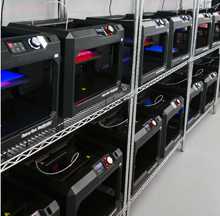Xavier University to open one of the first MakerBot Innovation Centers

Xavier University is partnering with MakerBot to bring a MakerBot Innovation Center to the university’s campus.
Xavier University joins a growing number of universities throughout the country that offer MakerBot Innovation Centers, which are designed to empower organizations to innovate faster, collaborate better, and compete more effectively.
MakerBot is providing the consulting, technical support, and training required to implement the MakerBot Innovation Center and will work closely with Xavier’s faculty to develop a curriculum that introduces professors and students to the world of 3D printing and its real-time possibilities.
The MakerBot Innovation Center at Xavier is a custom, centralized and scalable 3D printing solution that has been developed to meet the specific needs of the university, said officials.
It is designed to create an environment in which entrepreneurialism, education and innovation can be cultivated and encouraged in the Cincinnati area and beyond. With the MakerBot Innovation Center, students, faculty and the community are provided opportunities to collaborate on real-time prototyping, model making and small-scale creative and manufacturing projects.
Next page: How MakerBot will support Xavier University’s “innovation goals”
Implementing the maker movement technology is a way for the University to provide a “unique way to prepare students for the jobs of tomorrow by putting them at the forefront of technology and giving them access to a thriving community of innovators,” said officials.
With dedicated spaces for startups and networking, the MakerBot Innovation Center at Xavier is designed to attract local entrepreneurs, innovators and researchers. It will serve as a local “innovation hub” where students from different academic disciplines can gain invaluable hands-on experience by collaborating with entrepreneurs and researchers on real-world projects.
“Our mission at Xavier University is to educate our students so that they are able to make the world a better place. We’re positioned to do just that with the unique 3D printing and prototyping technology of MakerBot,” said Shawn Nason, chief innovation officer with Xavier University. “With these innovative MakerBot Replicator 3D Printers, we will transform how our students learn here at the Xavier Center for Innovation and beyond. With MakerBot, we’ll not only be ‘making’ 3D objects in our classrooms, but helping shape the leaders and innovators of future industries as well.”
The MakerBot Innovation Center for Xavier includes 31 MakerBot Replicator 3D Printers (25 MakerBot Replicator Desktop 3D Printers, three MakerBot Replicator Z18 3D Printers and three MakerBot Replicator Mini Compact 3D Printers), a large supply of MakerBot PLA Filament, several MakerBot Digitizer Desktop 3D Scanners and MakerBot MakerCare® Protection Plans. At the core of the MakerBot Innovation Center is the MakerBot Innovation Center Management Platform, a proprietary and innovative 3D printing software platform that links all 30+ MakerBot Replicator 3D Printers together, provides remote access, print queuing and mass production of 3D prints, and is designed to streamline productivity and staffing of the center. The scalable design of the MakerBot Innovation Center allows Xavier the option to easily add additional MakerBot 3D printing technology in the future.
“We’re particularly thrilled to provide the team at Xavier with Consulting from MakerBot to help develop a curriculum that integrates 3D printing. This is an important step that will help introduce more students, community members, and entrepreneurs to the idea of 3D printing and how this technology can help them visualize and memorize complex theoretical concepts, gain hands-on experience and unleash their creativity,” said Jenny Lawton, CEO of MakerBot.
Xavier University’s MakerBot Innovation Center is being built in conjunction with Consulting from MakerBot and training for university staff is being provided by MakerBot Learning.
Material from a press release was used in this report.
- CPL programs growing among adult students, learners of color - May 14, 2024
- 5 higher-ed IT leadership priorities - May 13, 2024
- Students say study abroad opportunities boost employability skills - May 10, 2024

